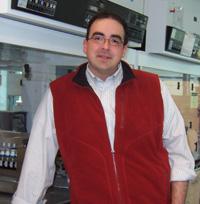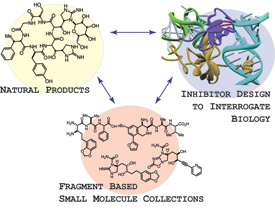Ryan E. Looper
Professor of Chemistry
Small Molecule Interactions in Biological Systems

Biological Chemistry Program
Education
B.S. Western Washington University
Ph.D. Colorado State University
Research
Our research program emphasizes the importance of small molecule interactions within biological systems. New synthetic methodology drives the synthesis of natural products and fragment based small molecule collections. An ancillary, yet possibly more profound goal of this program is to arm our national screening infrastructure with skeletally intriguing small molecules. These collaborative efforts facilitate the discovery of new targets and strategies for the advancement of biomedical research. Initially, our synthetic achievements will be aimed at exploring post-translational arginine modifications in cell signaling. The recent implication of these events in a number of disease states (multiple sclerosis, rheumatoid arthritis, glaucoma and tumorogenesis) encourages the preparation of biological tools and therapeutic leads. Projects poised to deliver antibiotic collections for the inhibition of prokaryotic protein synthesis will also be initiated. Molecules with purported rRNA binding interactions that are uncharacterized or non-overlapping with known sites of resistance will be targeted to advance our understanding of RNA's binding topology.

References
- Srinivas R. Paladugu, Chintelle K. James and Ryan E. Looper “A direct C11 alkylation strategy on the saxitoxin core; a synthesis of (+)-11-Saxitoxinethanoic acid” submitted, 2019
- Catherine M. Serrano, Hariprasada R. Kanna Reddy, Daniel R. Eiler, Michael R. Koch, Louis R. Barrows, Ryan T. Vanderlinden, Charles A. Testa, Paul R. Sebahar and Ryan E. Looper* “Unifying aminohexopyranose nucleoside antibiotics; implications for antibiotic design” submitted, 2019
- Dustin L. Williams, Scott R. Smith, R. Tyler Epperson, Brittany R. Peterson and Ryan E. Looper “Growth Substrate May Influence Biofilm Susceptibility to Antibiotics” PLOS One, 2019, in press.
- Williams, Dustin L.; Epperson, Richard T.; Ashton, Nicholas N.; Taylor, Nicholas B.; Kawaguchi, Brooke; Olsen, Raymond E.; Haussener, Travis J.; Sebahar, Paul R.; Allyn, Gina; Looper, Ryan E. “In vivo analysis of a first-in-class tri-alkyl norspermidine-biaryl antibiotic in an active release coating to reduce the risk of implant-related infection” Acta Biomaterialia, 2019 in press. PMID: 30710710
- Williams, Dustin L.; Epperson, Richard T.; Ashton, Nicholas N.; Taylor, Nicholas B.; Kawaguchi, Brooke; Olsen, Raymond E.; Haussener, Travis J.; Sebahar, Paul R.; Allyn, Gina; Looper, Ryan E. “In Vitro Testing of a First-In-Class Tri-alkylnorspermidine-biaryl Antibiotic in an Anti-biofilm Silicone Coating” Acta Biomaterialia 2019 in press. PMID:30769135
- Vaden, R. M.; Guillen, K. P.; Salvant, J. M.; Santiago, C. B.; Gibbons, J. B.; Pathi, S. S.; Arunachalam, S.; Sigman, M. S.; Looper, R. E.; Welm, B. E., A Cancer-Selective Zinc Ionophore Inspired by the Natural Product Naamidine A. ACS Chem. Biol. 2019, 14 (1), 106-117. PMID: 30571086
- Laukka, T.; Myllykoski, M.; Looper, R. E.; Koivunen, P., Cancer-associated 2-oxoglutarate analogues modify histone methylation by inhibiting histone lysine demethylases. Journal of Molecular Biology 2018, 430 (18, Part B), 3081-3092;
- Philip, B.; Yu, D. X.; Silvis, M. R.; Shin, C. H.; Robinson, J. P.; Robinson, G. L.; Welker, A. E.; Angel, S. N.; Tripp, S. R.; Sonnen, J. A.; VanBrocklin, M. W.; Gibbons, R. J.; Looper, R. E.; Colman, H.; Holmen, S. L., Mutant IDH1 Promotes Glioma Formation In Vivo. Cell Rep. 2018, 23 (5), 1553-1564;
- Bharat, D.; Cavalcanti, R. R. M.; Petersen, C.; Begaye, N.; Cutler, B. R.; Costa, M. M. A.; Ramos, R. K. L. G.; Ferreira, M. R.; Li, Y.; Bharath, L. P.; Toolson, E.; Sebahar, P.; Looper, R. E.; Jalili, T.; Rajasekaran, N. S.; Jia, Z.; Symons, J. D.; Anandh Babu, P. V., Blueberry Metabolites Attenuate Lipotoxicity-Induced Endothelial Dysfunction. Nutr. Food Res. 2018, 62 (2), n/a;
- McBrayer SK, Mayers JR, DiNatale GJ, Shi DD, Khanal J, Chakraborty AA, Sarosiek KA, Briggs KJ, Robbins AK, Sewastianik T, Shareef SJ, Olenchock BA, Parker SJ, Tateishi K, Spinelli JB, Islam M, Haigis MC, Looper RE, Ligon KL, Bernstein BE, Carrasco RD, Cahill DP, Asara JM, Metallo CM, Yennawar NH, Vander Heiden MG, Kaelin WG. Transaminase Inhibition by 2-Hydroxyglutarate Impairs Glutamate Biosynthesis and Redox Homeostasis in Glioma. Cell 2018, 175(1):101-116.e25. PMID: 30220459
- Tuomas Laukka, Matti Myllykoski, Ryan E. Looper, Peppi Koivunen “Cancer-associated 2-oxoglutarate analogues modify histone methylation by inhibiting histone lysine demethylases” Mol. Biol 2018, 430, 3081-3092.
- Joseph B. Gibbons, Justin M. Salvant, Rachel M. Vaden, Bryan E. Welm and Ryan E. Looper “A synthesis of naamidine A and selective access to N2-acyl-2-aminoimidazoles.” Org. Chem. 2015, 80, 10076–10085.
- Kaitlin J. Basham, Christopher J. Leonard, Collin Kieffer, Dawne N. Shelton, Vasudev R. Bhonde, Ryan E. Looper, and Bryan E. Welm “Dioxin Exposure Blocks Lactation Through a Direct Effect on Mammary Epithelial Cells Mediated by the Aryl Hydrocarbon Receptor Repressor”Sci. 2015, 143 (1), 36-45. PMCID: PMC4274378
- Jing Fan, Xin Teng, Ling Liu, Ryan E. Looper and Joshua D. Rabinowitz “Human phosphoglycerate dehydrogenase produces the oncometabolite D-2-hydroxyglutarate” ACS Chemical Biology 2015, 10, 510-516. PMCID:PMC4340346
